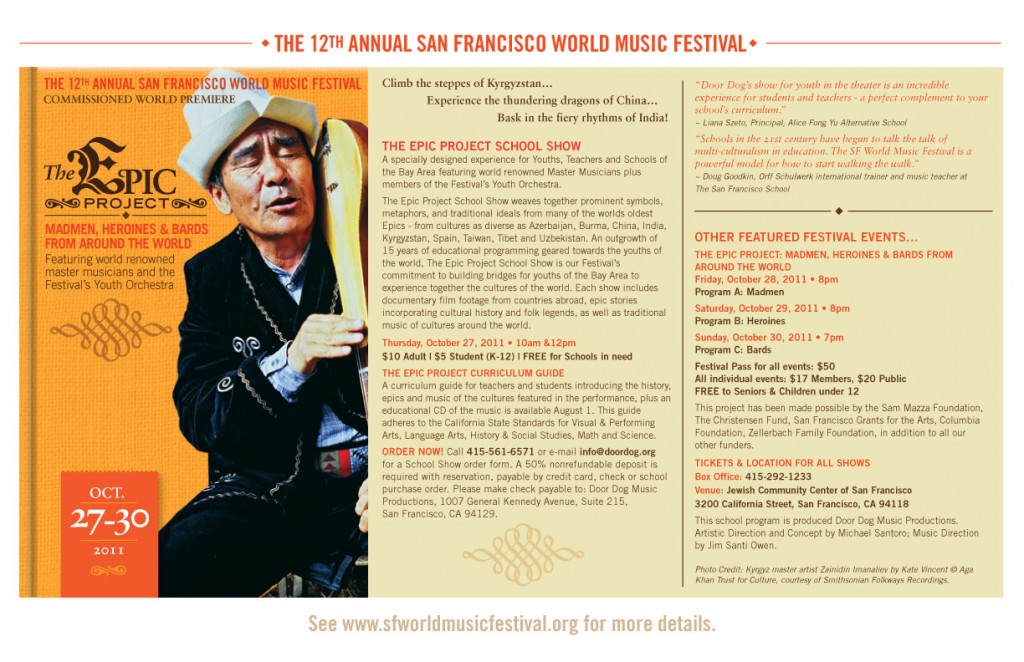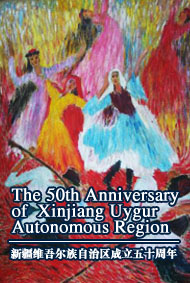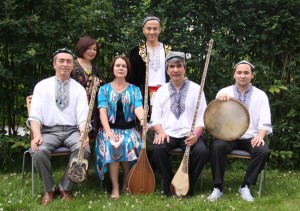San Francisco World Music Festival
http://portal.unesco.org/intangible
http://www.sfworldmusicfestival.org
http://www.uyghurensemble.co.uk
www.rferl.org/Radio Free Europe/Kyrgyz
Kyrgyzstan (English pronunciation: /ˈkɜrɡɪstɑːn/; KUR-gi-stahn; Kyrgyz: Кыргызстан IPA: [qɯrʁɯzstɑ́n]; Russian: Кыргызстан [kɨrɡɨsˈtan]), officially the Kyrgyz Republic, is a country in Central Asia. Landlocked and mountainous, it is bordered by Kazakhstan to the north, Uzbekistan to the west, Tajikistan to the southwest and People’s Republic of China to the east. Its capital and largest city is Bishkek. The ethnonym „Kyrgyz“, after which the country is named, is thought to originally mean „forty tribes“, presumably referring to the epic hero Manas who, as legend has it, unified forty tribes against the Khitans. The 40-ray sun on the flag of Kyrgyzstan symbolizes the forty tribes of Manas. It might also refer to “red”, the colour of the “south country” of the original Turkic nations. More
Uzbekistan, officially the Republic of Uzbekistan (Uzbek: O‘zbekiston Respublikasi or Ўзбекистон Республикаси);(Urdu: ازبکستان), is a doubly landlocked country in Central Asia, formerly part of the Soviet Union. It shares borders with Kazakhstan to the west and to the north, Kyrgyzstan and Tajikistan to the east, and Afghanistan and Turkmenistan to the south. Once part of the Persian Samanid and later Timurid empires, the region was conquered in the early 16th century by Uzbek nomads, who spoke an Eastern Turkic language. Most of Uzbekistan’s population today belong to the Uzbek ethnic group and speak the Uzbek language, one of the family of Turkic languages. Uzbekistan was incorporated into the Russian Empire in the 19th century and in 1924 became a constituent republic of the Soviet Union, known as the Uzbek Soviet Socialist Republic (Uzbek SSR). It has been an independent republic since December 1991. Uzbekistan’s economy relies mainly on commodity production, including cotton, gold, uranium, potassium, and natural gas. Despite the declared objective of transition to a market economy, Uzbekistan continues to maintain rigid economic controls, which often repel foreign investors. The policy of gradual, strictly controlled transition has nevertheless produced beneficial results in the form of economic recovery after 1995. Uzbekistan’s domestic policies on human rights and individual freedoms are often criticised by international organizations. More
Dear Friends, The 34th annual Mill Valley Film Festival will present a special evening of music on Saturday October 15th celebrating the life and work of the great master Indian musician and teacher, Ali Akbar Khan. The screening of the U.S. premiere of the documentary film Play Like a Lion: The Legacy of Maestro Ali Akbar Khan is one of the highlights of the 10-day film festival.
This concert will bring together award-winning world music artists who have been inspired and influenced by the „maestro“ and whose music spans classical Indian to African and western fusion.
Musicians for the evening include:
- Saturday, October 15th 9pm (doors 8pm) at 142
- Ali Akbar Khan’s son Alam Khan on sarod accompanied by Salar Nader on tabla and Manik Khan on tampura
- Grammy-winning bassist Rob Wasserman & Friends
- Grammy-nominated jazz saxophonist John Handy, who is featured in the film
- Master African drummer Kwaku Daddy accompanied by 10 drummers
- Grammy nominated singer and composer Sukhawat Ali Khan and Riffat Sultana (featured vocalist with Quincy Jones at the May 2011 Mawazine Festival, Morocco)
- And….special surprise local music legends who join the festival every year.
- Video greetings from Derek Trucks and Zakir Hussain
Throckmorton Theatre in Mill Valley – Play Like a Lion: A Concert Honoring Ali Akbar Khan. Tickets are $50 and are available online at mvff.com or by phone at 877-874-6833 or at the Rafael Film Center box office, 1118 4th St. San Rafael, the Mill Valley Chamber of Commerce, 85 Thockmorton Ave., and at 142 Throckmorton Theater day of show.
PLAY LIKE A LION: THE LEGACY OF MAESTRO ALI AKBAR KHAN
When a young Alam Khan asks about his family’s religion, his father, master North Indian musician Ali Akbar Khan, tells him, „Music is our religion.“ Play Like a Lion explores the deep musical lineage of the Khan family -a tradition in which the lines between father and teacher are blurred and the intervals between duty, love and music become a devotional song. Alam, a prodigious musician, taught at his father’s feet, is our guide for a rich, soulful journey into the legacy of the late maestro. Entrancing musical virtuosity and moving homage on display in footage featuring concerts, class time at the famed Ali Akbar School of Music and tribute performances by musical luminaries like Carlos Santana, Ustad Zakir Hussain and Mickey Hart.
Sun. October 9, 8:00PM, Christopher B. Smith Rafael Film Center, San Rafael
Wed. October 12, 9:15PM, CinéArts @ Sequoia, Mill Valley Tickets: mvff.com, Tel: 1-877-874-MVFF (6833)
Akyns are virtuoso performers: they are Kazakh poets and bards of improvisation. The Akyn improvises with lyrics while playing the dömbra to a set traditional rhythm. The Akyn must not only be a master dömbra player, but also an expert story-teller, with a good wit and a great sense of timing. Akyn competitions are exciting and humorous, full of theatre and soul. They bring life to a party, helping to strengthen the sense of community among villagers.
The Art of Akyns, Kyrgyz Epic Tellers UNESCO: Representative List of the Intangible Cultural Heritage of Humanity – 2008 URL: http://www.unesco.org/culture/ich/RL/00049
Description: The predominant form of cultural expression among the Kyrgyz nomads is the narration of epics. The art of the Akyns, the Kyrgyz epic tellers, combines singing, improvisation and musical composition. The epics are performed at religious and private festivities, seasonal ceremonies and national holidays and have survived over the centuries by oral transmission.
The value of the Kyrgyz epics lies largely in their dramatic plots and philosophical underpinnings. They represent an oral encyclopaedia of Kyrgyz social values, cultural knowledge and history. The pre-eminent Kyrgyz epic is the 1000-year-old Manas trilogy, which is noteworthy not only for its great length (sixteen times longer than Homers Iliad and Odyssey), but also for its rich content. Blending fact and legend, the Manas immortalizes important events in Kyrgyzs history since the ninth century. The Kyrgyzs have also preserved over forty smaller epics. While the Manas is a solo narration, these shorter works are generally performed to the accompaniment of the komuz, the three-stringed Kyrgyz lute. Each epic possesses a distinctive theme, melody and narrative style. Akyns were once highly respected figures who toured from region to region and frequently participated in storytelling contests. They were appreciated for their proficiency in narration, expressive gestures, intonation and lively mimicry, so well suited to the epics emotionally charged content.
During the 1920s, the first part of the Manas trilogy was recorded in written form based on the oral interpretation of the great epic singer, Sagynbay. The epics remain an essential component of Kyrgyz identity and continue to inspire contemporary writers, poets, and composers; even today, the traditional performances are still linked to sacred cultural spaces. Although there are fewer practitioners nowadays, master akyns continue to train young apprentices and are helped by recent revitalization initiatives supported by the Kyrgyz government. Country(ies): Kyrgyzstan
SF WORLD MUSIC FESTIVAL – AACM’s beloved tabla master, Pandit Swapan Chaudhuri, will be honored for his 30 years of performing and teaching in the U.S. at this year’s San Francisco World Music Festival – The Epic Project: Madmen, Heroines, and Bards From Around the World (http://www.sfworldmusicfestival.org/) – The Epic Project: Madmen, Heroines, and Bards From Around the World. October 27-30 www.sfworldmusicfestival.org
Swapanji will be performing on the opening night of the festival, Friday, October 28th, in a world premiere commissioned composition which he has composed for an array of musicians including AACM’s Youth Tabla ensemble and musicians from Kyrgyzstan, Azerbaijan, and South India.
The San Francisco World Music Festival, under the musical direction of AACM faculty member Jim Santi Owen, will be presenting world class musicians from Burkina Faso, India, Tibet, China, Azerbaijan, Taiwan, Kyrgyzstan performing repertoire from their countries‘ epic stories in both traditional settings and cross-cultural collaborations.
This is the third consecutive year that AACM is proud to be a co-sponsor of The San Francisco World Music Festival. Tickets are sure to sell out so purchase yours soon!
The Epic of Manas, a traditional epic poem of the Kyrgyz. http://www1.chinaculture.org/focus/2005-09/13/content_72812.htm
Manas of the Kirghiz people is famous as one of the three greatest Chinese epics, together with TibetanGesarand MongolianJianggar. Manas also is the name of the epic’s eponymous hero. The epic of Manas, with more than 210,000 lines, is one of the longest epics in the world, 20 times longer than Homer’sOdyssey. It falls into eight episodes, totaling 20 million characters.
The monumental epic Manas is the most treasured expression of the national heritage of the Kyrgyz people. Composed and sung entirely in oral form by various singers throughout the centuries, Manas is regarded as the epitome of oral creativity. Although as yet not widely known, for want of adequate translations, Manas is considered to be one of the greatest examples of epic poetry, whose importance is not inferior to that of the Homeric epic. As nomads, the Kyrgyz had no written language. However, they excelled in oral composition, which they artistically employed in their traditional poetry and epic songs. As the internationally renowned Kyrgyz writer Chingiz Aitmatov notes: „If other peoples/nations displayed their past culture and history in written literature, sculpture, architecture, theatre and art, the Kyrgyz people expressed their worldview, pride and dignity, battles and their hope for the future in epic genre.“
Upon gaining its independence from the Soviet Union in 1991, the Kyrgyz people, led by their first president, Askar Akaev, chose to enter the world’s cultural arena through their epic Manas. In summer of 1995, with the support of UNESCO, the Kyrgyz celebrated the 1000th anniversary of the epic. The new government of independent Kyrgyzstan used this grand occasion to introduce Kyrgyz history and culture to the world community.
Leaders, dignitaries, and scholars of many foreign countries, including the United States, were invited to the Manas celebrations, which lasted for five days. In the northern mountainous region of Talas, which is believed to be the homeland of the legendary hero Manas, Kyrgyz proudly presented their ancient nomadic history and culture to their guests by mounting a grand open-air theatrical show displaying the main scenes from the epic. It was the first and remains the largest national celebration that has taken place in Kyrgyzstan since its independence. The celebration was also a symbolic memorial feast and tribute offered to the hero Manas by his people. Click here to view videoclips of the restoration of what is termed the tomb of Manas at Talas, and the pilgrimages made to this shrine.
The Epic Manas – Today there are about sixty versions of the epic Manas recorded from various epic singers and oral poets. Its longest version, consisting of half a million (500553) poetic lines, was written down from one of the last master-manaschï (singers of Manas) Saiakbai Karalaev (1894-1971). The epic is indeed unique in its size. It is twenty times longer than the Homeric epics Iliad (15693) and Odyssey (12110) taken together and two and a half times the length of the Indian epic Mahabharata. http://www.silk-road.com/folklore/manas/manasintro.html
National aspect of Manas – The epic poem’s age is unknowable, as it was transmitted orally without being recorded. However, historians have doubted the age claimed for it since the turn of the 20th century. The primary reason is that the events portrayed occurred in the 16th and 17th centuries. Renowned Central Asian historian V. V. Bartol’d referred to Manas as an „absurd gallimaufry of pseudo-history,“ and Hatto remarks that Manas was „compiled to glorify the Sufi sheikhs of Shirkent and Kasan … [and] circumstances make it highly probable that… [Manas] is a late eighteenth-century interpolation.“
HUMAN RIGHTS – The Constitution of the Republic of Uzbekistan asserts that „democracy in the Republic of Uzbekistan shall be based upon common human principles, according to which the highest value shall be the human being, his life, freedom, honour, dignity and other inalienable rights.“
However, non-governmental human rights watchdogs, such as IHF, Human Rights Watch, Amnesty International, as well as United States Department of State and Council of the European Union define Uzbekistan as „an authoritarian state with limited civil rights“and express profound concern about „wide-scale violation of virtually all basic human rights“. According to the reports, the most widespread violations are torture, arbitrary arrests, and various restrictions of freedoms: of religion, of speech and press, of free association and assembly.
The reports maintain that the violations are most often committed against members of religious organizations, independent journalists, human rights activists and political activists, including members of the banned opposition parties. In 2005, Uzbekistan was included into Freedom House’s „The Worst of the Worst: The World’s Most Repressive Societies.“
The London Uyghur Ensemble (LUE) is a London-based group playing traditional and popular music of the Central Asian Uyghurs. Our group includes Uyghur musicians from the Uyghur homeland – East Turkistan (the Xinjiang Uyghur Autonomous Region of China) and from the Uyghur diaspora in Kyrgyzstan, in collaboration with professional British musicians. Our repertoire includes instrumental pieces, dance, composed and traditional songs, and the classical ‘Twelve Muqam’ suites. Since the group was established in 2004‚ we have worked hard to build our repertoire and profile. Some of our musicians and associates came to the UK as refugees‚ and we made our debut at the London South Bank ‘Sanctuary’ festival for refugee music in 2005. Since the group was established in 2004‚ we have worked hard to build our repertoire and profile. Some of our musicians and associates came to the UK as refugees‚ and we made our debut at the London South Bank ‘Sanctuary’ festival for refugee music in 2005. We have played in many venues around London including St Ethelburgas Centre for Peace and Reconciliation, the Diaspora London Music Village, SOAS World Music concert series, and the Islington Folk Club.
Gigs around the UK include Sheffield, Newcastle and Manchester, and the Sidmouth folk festival in Devon. Outside the UK we have performed at the Forde Folk festival in Norway, and the Taipei Silk Road festival in Taiwan. We perform regularly at Uyghur community events, and as part of the community´s efforts to reach out to wider audiences in the UK and elsewhere. Since our website was established in 2007, we have received considerable interest from Uyghurs in the Uyghur homeland and diaspora.
Click here for more details read more >>
Comments are closed.


